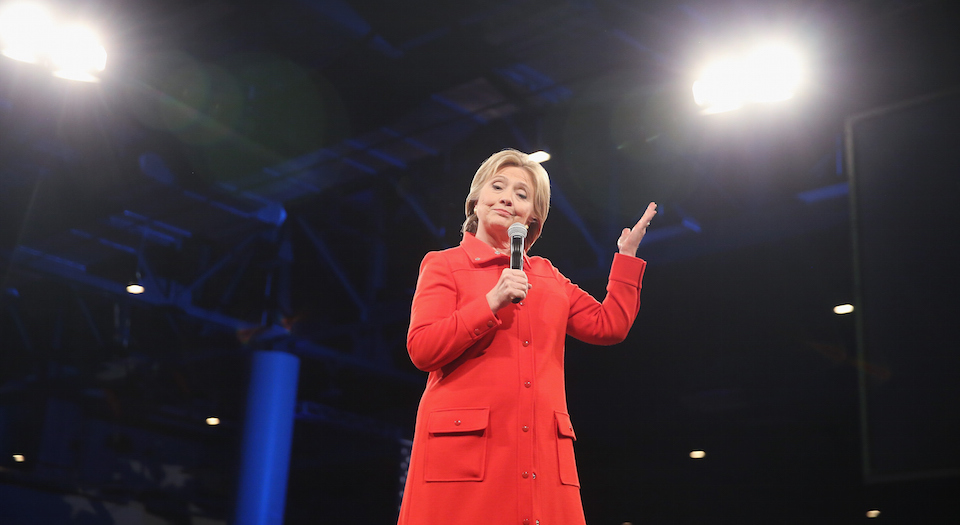Hillary’s feminist fall from grace
Why old-school gender politics is turning off young women.

Want unlimited, ad-free access? Become a spiked supporter.
It seems that Hillary Clinton’s decision to play the gender card has left her with a losing hand. Following her defeat in New Hampshire on Tuesday, it’s become apparent that Clinton’s reliance on chasing the female vote has turned off a significant number of voters.
Clinton’s 2008 campaign for the presidency pointedly denounced the idea that gender played an important role in her politics: ‘I am not running as a woman. I am running because I believe I am the best qualified and experienced person.’ What a difference eight years make. This time round, Clinton kicked off her campaign with a clear message that she was running for president as a ‘wife, mom [and] grandma’.
But Clinton’s recent exploitation of gender politics isn’t that much of a u-turn. In her 2008 concession speech, she famously announced:
‘Although we weren’t able to shatter that highest, hardest glass ceiling this time, thanks to you, it’s got about 18million cracks in it, and the light is shining through like never before, filling us all with the hope and the sure knowledge that the path will be a little easier next time.’
Clinton’s current campaign has simply picked up the mic from that speech in Washington, but this time with an almost blind commitment to chasing the female vote.
The list of Clinton’s famous supporters is like a who’s who of celebrity feminists. Jamie Lee Curtis, Lena Dunham, Katy Perry, Demi Lovato and other young famous women have come out in support of the grandma-in-chief.
Since the campaign began, Clinton’s feminist support base has been on the offensive, criticising the way in which Clinton has been supposedly stereotyped by the media. In a recent plug for the Clinton campaign, Dunham provided a list of ‘rabidly sexist’ words which had been used to describe Clinton. ‘I literally want to make a list that we hand to media outlets that says, “these are the words you can’t use when describing a female candidate”’, she wrote. This is all despite the fact that Dunham’s own interview with Clinton ended with what some might call a sexist question: ‘Our last question is by far our most important question, which is that we need to ask you about this dress.’
If you thought that was bad enough, Clinton’s campaign took a turn for the worse last week when old-school feminist Gloria Steinem and former Democratic secretary of state Madeleine Albright attempted to garner female support for Clinton by chastising young women who intended to vote for Clinton’s rival, Bernie Sanders. Albright gave female voters a stern warning, uttering her now infamous slogan, ‘There’s a special place in hell for women who don’t help each other!’. Meanwhile, Steinem told talk-show host Bill Maher that young women weren’t supporting Clinton because they were more interested in getting lucky: ‘When you’re young, you’re thinking: “Where are the boys?” The boys are with Bernie.’
Despite her claims otherwise, Clinton’s focus on ‘womanly politics’ is a clear endorsement of ‘vagina voting’. But though she has been criticised for courting the millennial vote, with Dunham donning embroidered Clinton outfits, this brand of gender-obsessed politics is not a specifically young phenomenon. The fact that both Steinem and Albright, proponents of the ‘personal is political’ generation of feminism, have come out with such rubbish shows that identity politics is not simply a millennial fashion: it has deeper roots, back to the start of second-wave feminism and its elevation of sexual identity over class and economic considerations.
In fact, young women have defended their choice not to be pigeonholed by their gender. The New York Times published several letters it received from women who were outraged by the suggestion that they had a duty to support Clinton simply because she was female. ‘I am tired of being condescended to by other women about the presidential election’, read one. ‘The cluelessness of these feminist elders is astounding’, read another.
Clinton’s presidential campaign is the result of decades of gender-obsessed feminism. Perhaps this is why Clinton has failed to hit it off with many young women who aren’t part of the small, identity-politics-obsessed campus scene, who don’t read the Vagenda or watch Girls. The Clinton camp has whinged about the Republicans’ use of Clinton’s personal life, especially in relation to her husband’s affair, as an argument against her. But what did she expect? Clinton’s entire campaign is focused on her personality and emotional relationships – her personal life is the basis of her political campaign.
I hope young women are turning away from Clinton in reaction to the insulting suggestion that politics is about electing someone who looks like you, rather than someone you believe in. But it’s probably not as simple as that – Bernie Sanders is hardly innocent of playing up to specific interest groups and courting the hip youth vote. Nevertheless, it’s exciting to see women rejecting the idea that simply having a female president would be beneficial to women. Never mind Clinton’s cracks in the glass ceiling, it is the cracks in her campaign that are really interesting.
Ella Whelan is staff writer at spiked. Follow her on Twitter: @Ella_M_Whelan
Picture by: Scott Olson / Getty Images.
£1 a month for 3 months
You’ve hit your monthly free article limit.
Support spiked and get unlimited access.
Support spiked – £1 a month for 3 months
spiked is funded by readers like you. Only 0.1% of regular readers currently support us. If just 1% did, we could grow our team and step up the fight for free speech and democracy.
Become a spiked supporter and enjoy unlimited, ad-free access, bonus content and exclusive events – while helping to keep independent journalism alive.
———————————————————————————————————————————–
Exclusive January offer: join today for £1 a month for 3 months. Then £5 a month, cancel anytime.
———————————————————————————————————————————–
Monthly support makes the biggest difference. Thank you.











Comments
Want to join the conversation?
Only spiked supporters and patrons, who donate regularly to us, can comment on our articles.